Redditor Comes Under Heated Criticism For Getting Frustrated About How His Dog Misbehaves
Owners frequently give up after the first failed attempt to train their dog to behave differently. Depending on how self-rewarding the action has been for your dog, it may take weeks to months to change behaviors like jumping on people, pulling during walks, barking for attention, or counter surfing.
When you introduce a collar slowly, for instance, to get your puppy or dog accustomed to wearing one, don't give up if she fusses or attempts to take it off.
Wear the leash or collar around the home while rewarding your dog with high-value treats, and then remove it once she has calmed down for a bit. She will enjoy wearing the collar in a week or two if you gradually increase the time each day.
So, it's important to give her plenty of time to comprehend what you expect of her so that you can be fair to her. In other words, you need to be patient and persistent!
This is what the OP in today's AITA story was lacking. The dog was acquired when she was three months old, and she was extremely well-behaved at the beginning.
The OP started with a good schedule of positive reinforcement training, but they had to stop due to the pup's health issues. However, when they resumed training later on, the pup became much less well-behaved, and it was challenging to leave her alone or take her anywhere.
The dog is making the OP frustrated and complaining nonstop

We started out with a good schedule of positive reinforcement training
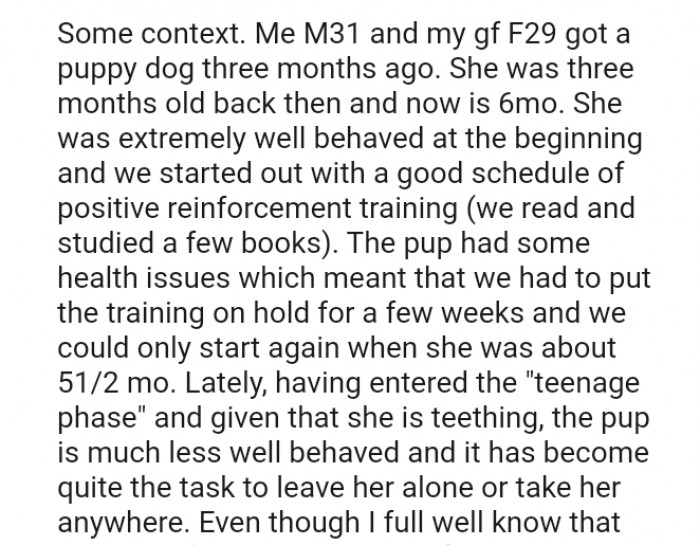
We were both fully aware that this would have been the scenario

Understanding Frustration in Pet Ownership
Frustration in pet ownership often stems from unmet expectations and perceived failures in training. According to Dr. Patricia McConnell, an animal behaviorist, pet owners frequently project their feelings onto their pets, leading to heightened emotional responses when things don't go as planned.
This scenario illustrates how the Redditor's frustration may reflect a mix of their expectations and the dog's behavior, creating a cycle of stress.
The Role of Emotional Regulation
Emotional regulation is a critical skill that many individuals struggle with, especially in stressful situations involving pets. Research published in the Journal of Abnormal Psychology indicates that individuals who lack effective emotional regulation strategies are more likely to experience heightened frustration and anger.
This inability to manage emotions can lead to conflicts not only with pets but also with other people in the household.
I was the one taking care of the dog most of the time

She's already doing pretty much all that she can
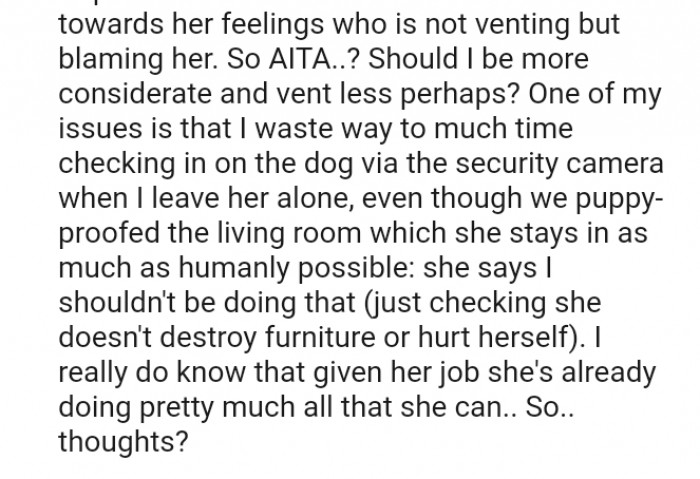
The OP came under serious backlash in the comments as Redditors spared no feelings while roasting him for being unrealistic. We've gathered some of the most upvoted comments from the Reddit thread for you to read through below.
It's just exhausting to be on the receiving end

The concept of 'learned helplessness' might also be relevant here. Studies show that when pet owners experience repeated failures in training, they may begin to feel powerless, leading to increased frustration and decreased motivation to continue training efforts.
This psychological phenomenon can be detrimental, as it hampers the owner's willingness to engage positively with the pet.
When pet owners experience frustration, it's often rooted in unmet expectations regarding their pet's behavior. Studies suggest that understanding the reasons behind a pet's actions can lead to more compassionate responses, reducing emotional outbursts.
This shift in perspective can help owners approach training and behavior modification with patience and empathy.
Training a dog takes time and patience
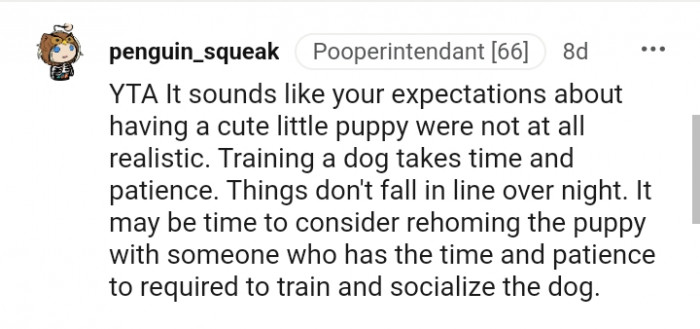
You need to sit down and talk about this gently

This Redditor seeks important information

The Importance of Emotional Regulation
Emotional regulation is crucial in managing frustration effectively. According to research published in the Journal of Emotional Psychology, individuals who practice emotional regulation techniques can better cope with challenges and reduce feelings of frustration.
For pet owners, implementing strategies such as mindfulness or positive reinforcement can help create a more constructive environment for both the owner and the pet.
Understanding Behavioral Issues in Pets
Behavioral issues in pets often stem from environmental factors, such as stress or lack of stimulation. Research in animal behavior emphasizes the importance of understanding these underlying causes to address misbehavior effectively.
By identifying triggers and environmental stressors, pet owners can take proactive steps to create a more harmonious living environment.
Your dog might also be bored and want to interact

You are not expecting anything of her and the dog

Find the dog a home with someone who understands their nature
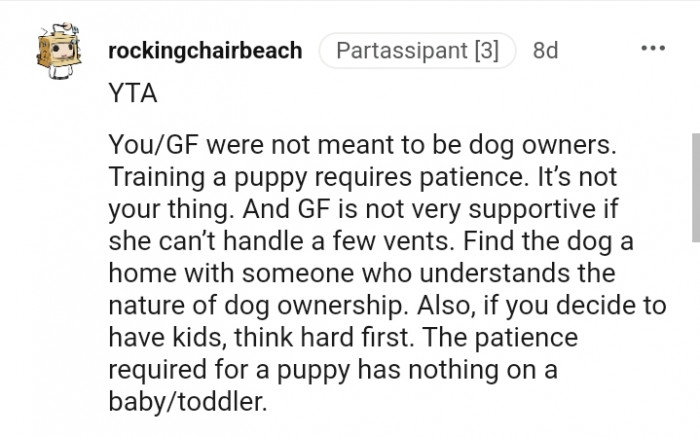
Moreover, it's important to understand the role of unrealistic expectations. Research shows that pet owners often have idealized views of pet behavior, which can lead to disappointment when reality doesn’t meet those expectations. By adjusting these views, the Redditor may find themselves more capable of coping with the dog's behavior.
This adjustment can foster a healthier relationship with the pet and reduce frustration levels.
Additionally, engaging in regular training and positive reinforcement can significantly improve a pet's behavior. Studies show that pets respond better to training when owners remain calm and consistent, ultimately reducing frustration levels for both parties.
This approach fosters a more positive relationship between the owner and the pet, leading to improved interactions.
She thinks that when I'm venting, I'm blaming her

Thankfully, the OP saw reason and thanked everyone for the feedback, which might be why he added this update in the comments
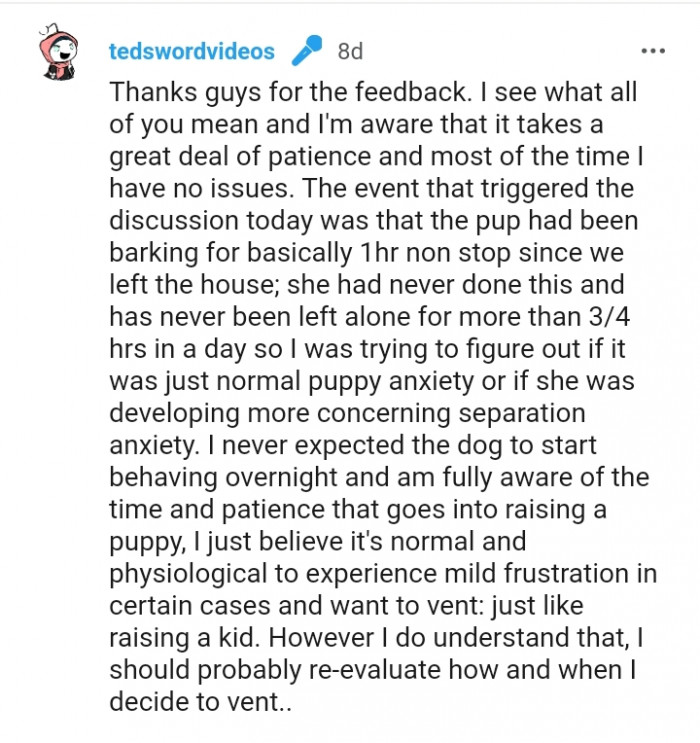
You ought to keep in mind that you are speaking to an animal that understands a different language than you. However, you can rest assured that your dog wants to know what you expect of her, but it will take some time and effort to explain your expectations to your canine friend.
What are your thoughts about this story? Do share this post with others as well.
Effective Coping Strategies for Owners
Developing coping strategies is essential for pet owners facing challenges with their animals. Techniques such as mindfulness and deep breathing can help owners manage their emotional responses more effectively.
Research from the American Psychological Association indicates that practicing mindfulness can lead to lower levels of stress and increased emotional regulation, which benefits both the owner and the pet.
Ultimately, owning a pet requires patience, understanding, and effective communication skills. By enhancing emotional regulation and employing positive reinforcement techniques, pet owners can create a more supportive environment for their pets, leading to better behavior and a stronger bond.
Taking the time to learn about animal behavior can empower owners to approach challenges with empathy and resolve conflicts more effectively.
Psychological Analysis
This situation highlights the emotional challenges many pet owners face when their expectations aren't met. It's important for owners to recognize their feelings and develop strategies to cope with frustration constructively.
Analysis generated by AI
Analysis & Alternative Approaches
In conclusion, understanding and regulating emotions is vital for successful pet ownership.
By adopting effective coping strategies and fostering a positive relationship with pets, owners can significantly enhance their experience and reduce frustration.
Practical Solutions for Managing Frustration
To manage frustration effectively, setting realistic training goals is essential. Gradual, incremental training can lead to more achievable outcomes, reducing feelings of overwhelm. Research suggests that breaking down tasks into smaller, manageable steps can enhance motivation and success rates in training.
This approach encourages patience and consistency, which can lead to better behavioral outcomes for the dog.
Additionally, seeking support from a professional dog trainer can provide valuable guidance. Collaborating with an expert can offer new strategies and insights that the Redditor may not have considered, fostering a more positive training environment.
Research indicates that pet owners who engage with trainers often experience greater success in training efforts, leading to improved relationships with their pets.
Analysis & Alternative Approaches
In conclusion, frustration in pet ownership is a common experience that can be addressed through emotional regulation and realistic expectations. Understanding the psychological principles at play can help owners navigate these challenges more effectively.
By implementing practical strategies and seeking support, pet owners can foster healthier relationships with their pets, ultimately leading to more satisfying experiences.



